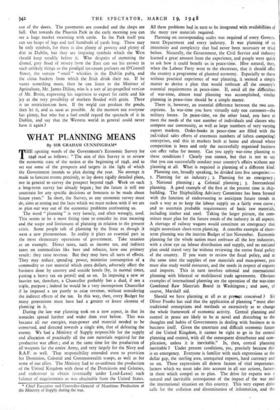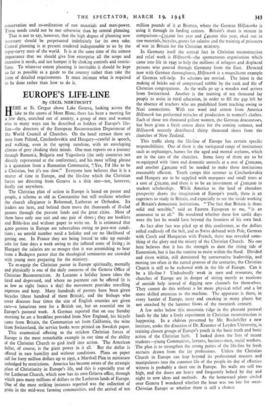WHAT PLANNING MEANS
By SIR GRAHAM CUNNINGHAM*
THE opening words of the Government's Economic Survey for 1948 read as follows: " The aim of this Survey is to review the economic state of the nation at the beginning of 1948, and to set out some of the prospects and targets in the light of which the Government intends to plan during the year. No attempt is made to forecast events precisely, to lay down rigidly detailed plans, nor in general to survey the prospect beyond 1948. Work on such a long-term survey has already begun ; but the future is still too uncertain for any specific decisions or forecasts to be made about future years." In short, the Survey, as any economic survey must do, aims at setting out the facts which we must reckon with if we are to plan our way out of the economic problems confronting us.
The word " planning" is very loosely, and often wrongly, used. This seems to be a most fitting time to consider its true meaning and the scope and limitations of planning in relation to the present crisis. Some people talk of planning by the State as though it were a new phenomenon. In reality it plays an essential part in the most elementary operations of government. Take taxation as an example. Direct taxes, such as income tax, and indirect taxes on commodities like beer and tobacco, have one primary result: they raise revenue. But they may have all sorts of effects. They may reduce, spending power, minimise consumption of a commodity or raw material which costs dollars, adversely affect the business done by country and seaside hotels (by, in normal times, putting a heavy tax on petrol) and, so on. In imposing a new or heavier tax, therefore, a Chancellor probably has a dual, if not a triple, purpose ; indeed he would be a very incompetent Chancellor if he imposed a tax purely to raise revenue, without considering the indirect effects of the tax. In this way, then, every Budget for many generations must have had a greater or lesser element of planning in it.
During the late war planning took on a new aspect, in that its tentacles spread further and wider than ever before. This was because all our energies, man-power and material needed to be conserved, and directed towards a single aim, that of defeating the enemy. We had a Ministry of Supply responsible for the supply and allocation of practically all the raw materials required for the productive war effort ; and at the same time for the production of all weapons for the entire Army, and very largely for the Navy and R.A.F. as well. That responsibility extended even to provision for Dominion, Colonial and Commonwealth ti oops, as well as for some of our allies. The Ministry had to co-ordinate the production of the United Kingdom with those of the Dominions and Colonies, and endeavour to obtain (eventually under Lend-Lease) such balance of requirements as was obtainable from the United States.
* Chief Executive and Controller-General of Munitions Production at the Ministry of•Supply during the war. All these problems had in turn to be integrated with availabilities of the many raw materials required.
Planning on corresponding scales was required of every Govern- ment Department and every industry. It was planning of an immensity and complexity that had never been necessary or tried before. Naturally, the Government, the Civil Service and industry learned a great amount from the experience, and people were quick to ask how it could benefit us in peace-time. H'ow natural, then, when the Labour Party went to the electorate, that it should offer the country a programme of planned economy. Especially to those without practical experience of war planning, it seemed a simple matter to devise a plan that would embracie all the country's essential requirements in peace-time. If, amid all the difficulties of war-time, almost total planning was accomplished, similar planning in peace-time should be a simple matter.
There is, however, an essential difference between the two con- ceptions. In war-time you have virtually only one customer—the military forces. In peace-time, on the other hand, you have to meet the needs of the vast number of individuals and classes who compose our community, as well as large numbers of very varying export markets. Order-books in peace-time are filled with the individual sales efforts of enormous numbers of (often competing) enterprises, and this in markets both at home and abroad where competition is keen and only the successfully organised business can offer value for money. Can you apply war-time planning to these conditions ? Clearly you cannot, but that is not to say that you can successfully conduct your country's affairs without any planning at all. What is required is planning of a different kind.
Planning can, broadly speaking, be divided into five categories:-
1.
Planning for an industry ; 2. Planning for an emergency ; 3. National planning ; 4. Colonial planning ; 5. International planning. A good example of the first at the present time is ship- building. The Shipbuilding Advisory Committee has been formed with the function of endeavouring to anticipate future trends in such a way as to keep the labour supply on a fairly even curve ; and to ascertain probable requirements of basic raw materials, including timber and steel. Taking the larger picture, the com- mittee must plan for the future needs of the industry in all aspects. A shortage of railway wagons would constitute an emergency that might necessitate short-term planning. A concrete example of short- term planning was the interim Budget of last November. Economic planning for the whole nation must embrace all the key industries, with a close eye on labour distribution and supply, and no national plan could travel very far without reviewing the entire fiscal policy of the country. If you want to review the fiscal policy, and at the same time the supplies of raw materials and man-power, you must also study world resources, and the needs in respect of exports and imports. This in turn involves colonial and international planning with bilateral or multilateral trade agreements. Obvious examples of international planning are the operation of the war-time Combined Raw Materials Board in Washington ; and now, of course, Marshall aid.
Should we have planning at all as at preeant conceived ? Sir Oliver Franks has said that the application of planning " must alter traditional conceptions and methods so extensively as to change the whole framework of economic activity. Central planning and control in peace are likely to be as novel and disturbing to the thoughts and habits of Governments in dealing with business as to business itself. Given the uncertain and difficult economic future of the United Kingdom, it cannot be right to go in for central planning and control, with all the consequent disturbance and com- plication, unless it is inevitable." Is, then, central planning inevitable ? Under present conditions, yes, precisely because this is an emergency. Everyone is familiar with such expressions as the dollar gap, the sterling area, unrequited exports, hard currency and so on. These expressions all denote factors of vital importance, factors which we must take into account in all our actions, factors in short which compel us to plan. The drive for exports was a natural and inevitable consequence of the impact of the war and the international situation on this country. This very export drive calls for the collation and dissemination of information, and the
conservation and co-ordination of raw materials and man-power. These needs could not be met otherwise than by central planning.
That is not to say, however, that the high degree of planning now necessary should be perpetuated indefinitely for its own sake. Central planning is at present rendered indispensable to us by the topsy-turvy state of the world. It is at the same time of the utmost importance that we should give free enterprise all the scope and incentive it needs, and not hamper it by choking controls and restric- tions. To whatever extent planning is inevitable it should be kept so far as possible as a guide to the country rather than take the form of detailed requirements. It must intimate what is required to be done rather than how to do it.































 Previous page
Previous page